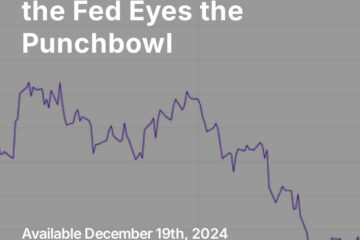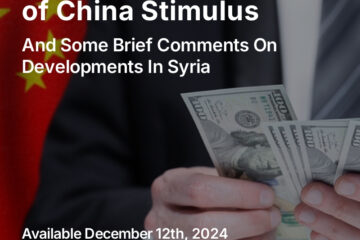As we have done for decades, we are writing with our favorite global investments for 2019. This prediction is for the first half of 2019. If there is no world recession in 2019 and one is not expected for 2020, or if a good trade settlement is reached with China, we will revise our outlook when the settlement takes place or before midyear to give our outlook for the remainder of the year.
Favorite Areas for Investment in 2019
We realize that many participants in today’s investment markets are frightened and concerned that the U.S. market will experience more volatility and declines in coming weeks and months.
Our view is that attractive investment areas in the U.S. market will change as we go through a period of consolidation and base building after the recent market volatility. At GIM we are not bearish on the opportunities for 2019, but we believe that during the period of base building, markets will wait for news related to (1) global trade, (2) European economic growth, and (3) Chinese economic growth, before deciding which markets and companies will produce stock market appreciation.
In our view, for globally oriented investors, a part of the portfolio can currently be invested in areas where many investors are not usually active. We believe that for most investors, T-bills offer an opportunity to earn interest while they wait out the current turmoil, and wait for new leadership to assert itself in the U.S. market.
For those with a more global investment approach, we outline below several areas where we may be investing part of clients’ portfolios not to exceed 20% or 30% for the next few months. As we point out below, the advent of a recession or expected recession in 2019 or 2020, or a settlement of the trade disputes between China and the U.S., would quickly change our investment strategy. We will keep you abreast of changes as we become aware of them.
In the early months of 2019, we expect Brazil, gold, the Japanese yen, and selected emerging markets to do well versus the U.S. Later in the year, providing that no recession is on the horizon in early 2020, we expect a rally in U.S. stocks. This will probably cause them to rise in line with the growth of corporate profits, which should be about 7%.
Brazil
Brazil’s stock market is rising, benefitting from the inauguration of a new president. The controversial conservative Jair Bolsonaro ran on a platform to support family values and stop crime and corruption. He’s a retired military man who served in the Brazilian Chamber of Deputies for 27 years until winning the presidency late last year. Bolsonaro received 55% of the popular vote.
Brazilian investors have greeted his election with higher prices for the Brazilian real, stocks, and bonds. They hope that his election will end a cycle of economic hardship that came amidst the revelations of massive corruption and mismanagement by previous administrations. That scandal resulted in the imprisonment of former president Lulu da Silva and the impeachment of his successor Dilma Rousseff.
Bolsanaro is not knowledgeable about economics, but the Brazilian markets are happy that he has embraced free-market economic policies and hired advisors who follow this approach. He has also endorsed closer ties to the U.S. and to Israel.
Gold
Gold is strong because of concerns that trade frictions will continue worldwide. Europe and Asia are experiencing slowing economic growth, although China is now moving to stimulate growth in their region. Investors also fear that a divided government in the U.S. will cause a slowdown in U.S. economic growth. Finally, a U.S. dollar that is not rising will allow gold and some other precious metals to rise in price. We anticipate that gold will rise to about $1,350 /ounce in 2019 and if the U.S. dollar begins to fall in value versus other currencies, gold (which is denominated in U.S. dollars) will rise further.
The Japanese Yen
Japanese economic growth continues to move slowly ahead, but their currency has suffered too much over the last few years, and is due for a continued rally to about 100 yen to the U.S. dollar (from about 110 currently).
India
Our other favorite emerging market is India. India has an economy which is not highly connected to the rest of the industrialized world.
India exports mainly services rather than goods to the developed countries, and within India, most consumption is of domestic products.
India imports oil, which has fallen in price, and this aids a moderation in Indian inflation. The pro-business Bharata Janata Party (BJP) has lost some elections recently, but they have pushed through many growth-oriented initiatives in the last few years. If they can hold on to national power, we will see continued economic growth and well being in India.
Areas We Don’t Favor
For the first part of 2019, we do not favor the U.S. (although a few companies with strong fundamentals may be attractive), Europe, or China.
World markets, and the U.S. in particular, would be pleased to see a trade settlement between the U.S. and China that stopped the forced transfer of intellectual property, and that reduced or prevented industrial espionage by China. The U.S. is not alone in this demand. Many countries have the same problems with Chinese policies.
In these pages, we have often pointed out the problems with Europe, including a weak banking system, absurdly low interest rates, very slow economic growth, and trade issues with China. Brexit is an additional worry, as is the weakness of a number of banks in southern European countries.
China has its own problems: a credit-based economy with far too much debt and too many loans made by non-official shadow banks, “street corner” lenders and the like. A plan to slow down credit expansion was implemented a few years ago, and it caused economic growth to slow even before the trade frictions began with the U.S and the rest of the world.
The trade frictions are further slowing China’s growth, which we estimate is currently about 3%. Two and a half months ago, China began a gradual loosening of the lending restrictions that had been in place; since then, several other steps have been taken to loosen credit. In our view, these actions will eventually lead to rising economic growth in China.
The same approach has been taken before on several occasions when China has tried to slow down credit expansion, and then had to reverse the process. In the past, these actions have stimulated economic growth after about nine months, and we believe that they will probably do so again.
Crypto and Blockchain
After a harrowing 2018 for cryptocurrencies, many speculators are nursing their wounds, but crypto and blockchain enthusiasts continue to note regulatory and technological progress. Although cryptocurrency markets remain largely opaque and untrustworthy, institutions are preparing to adopt potentially game-changing blockchain-based solutions for broader financial markets.
To name two, Overstock.com [NASDAQ: OSTK] is pushing ahead with its tZero project for tokenized security exchanges on a digital ledger, and Facebook [NASDAQ: FB] is reported to be preparing a “stablecoin” (a digital currency pegged to a fiat currency) to facilitate financial transactions in its WhatsApp platform. FB is targeting the fragmented electronic payment market in India, where an alignment of interests is apparent with the Indian government’s desire to reduce the role of cash and boost tax compliance. (WhatsApp currently has about 200 million monthly active users in India.) 2019 may or may not bring a crypto renaissance, but we will continue to keep you apprised of important developments.
Please note that principals of Guild Investment Management, Inc. (“Guild”) and/or Guild’s clients may at any time own any of the stocks mentioned in this article, and may sell them at any time. Currently, Guild’s clients own FB. In addition, for investment advisory clients of Guild, please check with Guild prior to taking positions in any of the companies mentioned in this article, since Guild may not believe that particular stock is right for the client, either because Guild has already taken a position in that stock for the client or for other reasons.
Thanks for listening; we welcome your calls and questions.



